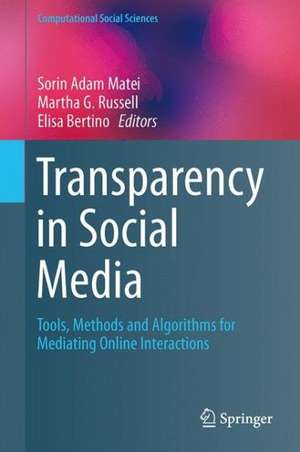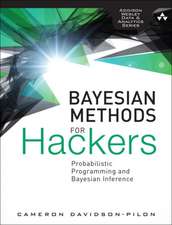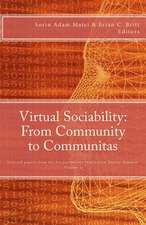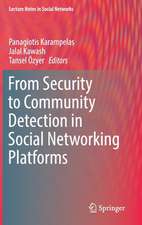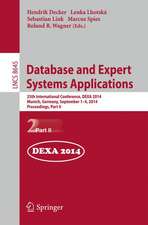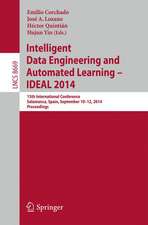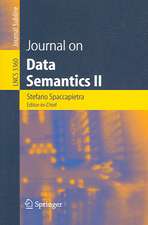Transparency in Social Media: Tools, Methods and Algorithms for Mediating Online Interactions: Computational Social Sciences
Editat de Sorin Adam Matei, Martha G. Russell, Elisa Bertinoen Limba Engleză Hardback – 4 aug 2015
The chapters demonstrate thought leadership through new ways of constructing social media experiences and making traces of social interaction visible. Transparency in Social Media aims to help researchers and practitioners design services, tools, or methods of analysis that encourage a more transparent process of interaction and communication on social media. Knowing who has added what content and with what authority to a specific online social media project can help the user community better understand, evaluate and make decisions and, ultimately, act on the basis of such information.
Din seria Computational Social Sciences
- 15%
 Preț: 649.39 lei
Preț: 649.39 lei - 18%
 Preț: 964.54 lei
Preț: 964.54 lei - 15%
 Preț: 643.34 lei
Preț: 643.34 lei - 15%
 Preț: 640.88 lei
Preț: 640.88 lei - 20%
 Preț: 338.16 lei
Preț: 338.16 lei -
 Preț: 390.63 lei
Preț: 390.63 lei -
 Preț: 395.47 lei
Preț: 395.47 lei - 20%
 Preț: 662.11 lei
Preț: 662.11 lei - 20%
 Preț: 760.97 lei
Preț: 760.97 lei - 20%
 Preț: 628.80 lei
Preț: 628.80 lei - 20%
 Preț: 649.93 lei
Preț: 649.93 lei - 20%
 Preț: 761.44 lei
Preț: 761.44 lei - 15%
 Preț: 643.48 lei
Preț: 643.48 lei - 18%
 Preț: 1117.34 lei
Preț: 1117.34 lei - 20%
 Preț: 1169.47 lei
Preț: 1169.47 lei -
 Preț: 432.12 lei
Preț: 432.12 lei -
 Preț: 393.13 lei
Preț: 393.13 lei - 18%
 Preț: 887.38 lei
Preț: 887.38 lei -
 Preț: 383.93 lei
Preț: 383.93 lei - 20%
 Preț: 241.67 lei
Preț: 241.67 lei - 15%
 Preț: 523.07 lei
Preț: 523.07 lei -
 Preț: 428.07 lei
Preț: 428.07 lei - 15%
 Preț: 693.06 lei
Preț: 693.06 lei -
 Preț: 487.75 lei
Preț: 487.75 lei - 20%
 Preț: 1166.19 lei
Preț: 1166.19 lei - 15%
 Preț: 696.02 lei
Preț: 696.02 lei - 20%
 Preț: 1156.62 lei
Preț: 1156.62 lei - 25%
 Preț: 470.32 lei
Preț: 470.32 lei
Preț: 618.06 lei
Preț vechi: 772.58 lei
-20% Nou
Puncte Express: 927
Preț estimativ în valută:
118.28€ • 123.03$ • 97.65£
118.28€ • 123.03$ • 97.65£
Carte tipărită la comandă
Livrare economică 11-17 aprilie
Preluare comenzi: 021 569.72.76
Specificații
ISBN-13: 9783319185514
ISBN-10: 3319185519
Pagini: 318
Ilustrații: VI, 318 p. 78 illus., 67 illus. in color.
Dimensiuni: 155 x 235 x 19 mm
Greutate: 0.76 kg
Ediția:1st ed. 2015
Editura: Springer International Publishing
Colecția Springer
Seria Computational Social Sciences
Locul publicării:Cham, Switzerland
ISBN-10: 3319185519
Pagini: 318
Ilustrații: VI, 318 p. 78 illus., 67 illus. in color.
Dimensiuni: 155 x 235 x 19 mm
Greutate: 0.76 kg
Ediția:1st ed. 2015
Editura: Springer International Publishing
Colecția Springer
Seria Computational Social Sciences
Locul publicării:Cham, Switzerland
Public țintă
ResearchCuprins
Part I. Overtures to Transparency in Social Media.- Introduction.- Socio-Computational Frameworks, Tools and Algorithms for Supporting Transparent Authorship in Social Media Knowledge Markets: Lessons from the second KredibleNet Workshop.- Part II. Assessing Provenance and Pathways in Social Media: Case studies, methods and tools.- Robust Aggregation of Inconsistent Information - Concepts and Research Directions.- Weaponized Crowdsourcing.- The Structures of Twitter Crowds and Conversations.- Visible Effort: Visualizing and measuring group structuration through social entropy.- Stepwise segmented regression analysis: An iterative statistical algorithm to detect and quantify evolutionary and revolutionary transformations in longitudinal data.- Towards Bottom-up Decision Making and Collaborative Knowledge Generation in Urban Infrastructure Projects through Online Social Media.- Biometric-Based User Authentication and Activity Level Detection in a Collaborative Environment.- Part III. Improving transparency through documentation and curation.- In the Flow: Evolving from Utility Based Social Medium to Community Peer.- Ostinato: The exploration-automation cycle of user-centric, process-automated data-driven visual network analytics.- Visual Analytics of User-influence based Dynamic Social Networks using Twitter Data.- Transparency, control and content generation on Wikipedia: Editorial strategies and technical affordances.- Part IV Transparency in social media: ethical and critical dimensions.- Truth Telling and Deception in Internet Society.- Embedding Privacy and Ethical Values in Big Data Technology.- Strategies for critical understanding of social media content.
Textul de pe ultima copertă
The volume presents, in a synergistic manner, significant theoretical and practical contributions in the area of social media reputation and authorship measurement, visualization, and modeling. The book justifies and proposes contributions to a future agenda for understanding the requirements for making social media authorship more transparent. Building on work presented in a previous volume of this series, Roles, Trust, and Reputation in Social Media Knowledge Markets, this book discusses new tools, applications, services, and algorithms that are needed for authoring content in a real-time publishing world. These insights may help people who interact and create content through social media better assess their potential for knowledge creation. They may also assist in analyzing audience attitudes, perceptions, and behavior in informal social media or in formal organizational structures. In addition, the volume includes several chapters that analyze the higher order ethical, critical thinking, and philosophical principles that may be used to ground social media authorship. Together, the perspectives presented in this volume help us understand how social media content is created and how its impact can be evaluated.
The chapters demonstrate thought leadership through new ways of constructing social media experiences and making traces of social interaction visible. Transparency in Social Media aims to help researchers and practitioners design services, tools, or methods of analysis that encourage a more transparent process of interaction and communication on social media. Knowing who has added what content and with what authority to a specific online social media project can help the user community better understand, evaluate and make decisions and, ultimately, act on the basis of such information.
The chapters demonstrate thought leadership through new ways of constructing social media experiences and making traces of social interaction visible. Transparency in Social Media aims to help researchers and practitioners design services, tools, or methods of analysis that encourage a more transparent process of interaction and communication on social media. Knowing who has added what content and with what authority to a specific online social media project can help the user community better understand, evaluate and make decisions and, ultimately, act on the basis of such information.
Caracteristici
Proposes new methods for measuring, visualizing and modelling how opinion leaders and influential authors emerge in social media Advances new approaches to theory based tools, algorithms, methods or visualization techniques that can help ordinary users better understand the origin and motivations of a given social media unit of content Highlights the most important areas of research regarding the development of algorithms, tools and services for modeling social media authorship and reputation
